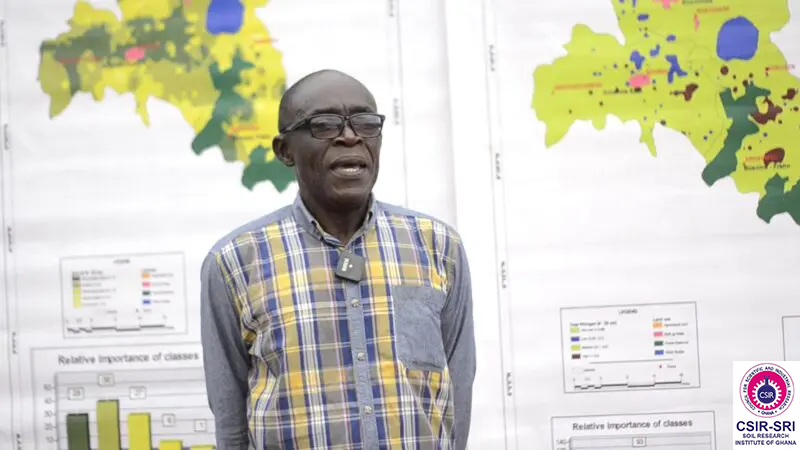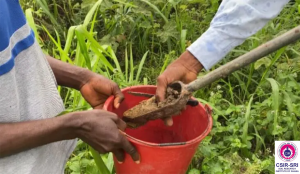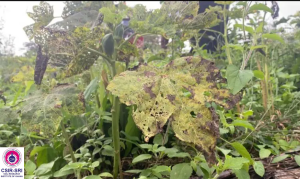68% OF SOILS IN BOSOMTWI DISTRICT ARE ACIDIC DUE TO EXCESSIVE FERTILISER APPLICATION- CSIR-SOIL RESEARCH INSTITUTE.


Researchers at the CSIR-Soil Research Institute (CSIR-SRI) report that, under their fertility mapping project in Ayaase-Adwafo, located in the Bosomtwi district of the Ashanti region, 68% of soils in the Amansie East, Bosomtwi, and Bosome Freho districts are increasingly becoming acidic. The researchers attribute the unhealthy nature of the soils to excessive application of inorganic fertiliser and poor farming practices. The sand samples taken from the farms were tested for their acidity, organic matter levels phosphorus and other essential soil nutrient contents.
 Farmers in these communities lament the pain of growing on infertile land, which has affected their production over the years. The exercise is to know the soil profile of their parcel of land. The farmers are in Ayaase-Adwafo, a suburb of Kuntanse, the district capital of Bosomtwe in the Ashanti region. Mr. Augustine Nkrumah, a farmer from Yaase-Adwafo, joined the SRI team of researchers to collect soil samples from his farm for testing at the CSIR-SRI laboratory. “We don’t know what is wrong with the soil. Previously, we were able to achieve good harvests of
Farmers in these communities lament the pain of growing on infertile land, which has affected their production over the years. The exercise is to know the soil profile of their parcel of land. The farmers are in Ayaase-Adwafo, a suburb of Kuntanse, the district capital of Bosomtwe in the Ashanti region. Mr. Augustine Nkrumah, a farmer from Yaase-Adwafo, joined the SRI team of researchers to collect soil samples from his farm for testing at the CSIR-SRI laboratory. “We don’t know what is wrong with the soil. Previously, we were able to achieve good harvests of
Cabbages”, he said. The cabbages grow, and they turn yellow -what we call here. We now cannot even harvest twenty bags. But initially, we could get 100 to 150 bags”, he said.
The unhealthy and diminishing harvests led to an overreliance on pesticides and inorganic fertilizers in hopes of revitalizing their farms. However, the situation did not improve. “We used to apply ammonia and N-P-K (15-15-15), but nothing is changing. We can’t achieve good yields, and we also have to pay our labourers,” he added. Farmers in the Kuntanse in the Bosomtwe enclave are mainly in the cultivation of grains, horticultural crops like vegetables, and other staple crops. The farmers fondly abuse fertilizers to boost growth to gain income and profits within the shortest possible time after cultivation.
Mrs. Patricia Boamah, the agricultural extension officer for Bosomtwi district said because vegetables are cash crops, the farmers do not want to even apply the poultry manure, but just the fertilizer. They feel the poultry manure will delay them. Farmers usually abuse the fertilizer to hurriedly gain more. “Their situation reflects that of many farmers across the country who overly depend on the sole application of inorganic fertilizers to increase their yields”. She added.
The sand samples taken from the farms were tested for their acidity, organic matter levels phosphorus and other essential soil nutrient contents. After the series of tests, the sample was found to be unhealthy for plant growth – it had higher acidic levels of 4.7 and declining nutrients. This confirms a recent study by the CSIR-SRI with support from the OCP Foundation of Morocco which revealed soils in the Bosomtwe, Bosome Freho and Amansie East districts were declining in fertility. 68% of soils in these farming areas were proven to be more acidic – a limit beyond the approved acidic range of 6 to 7 for soils.
Dr. Francis Tetteh, lead scientist at CSIR-SRI said declining soil fertility is the main challenge to crop production in Ghana. “We have to correct this underlying problem of acidity before we can improve crop production. We are talking of a wide yield gap. Cocoa grown here is only about 380kg per hectare. But we can get 1 tonne per hectare,” he said.
“Lime will correct this. But our farmers have not been well educated to apply it to their soils. So, they keep using fertilizers. Meanwhile, all fertilizers are acidic. So, as you use the fertilizer you must use the lime,” Dr. Tetteh advised